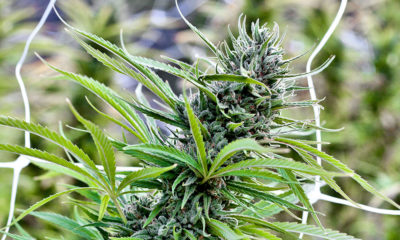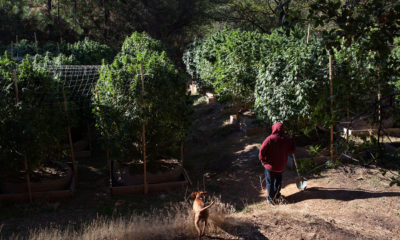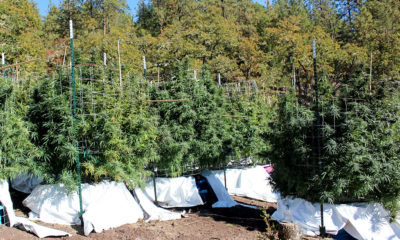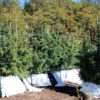Photos Shannon Paras
You Grow Girl! How the Grow Sisters Show Their Expertise
The Grow Sisters educate and empower women in cannabis agriculture.
Siobhan Danger Darwish wants you — yes, you! — to get excited about the future of cannabis, because she is excited about the future of cannabis and her enthusiasm is contagious.
Darwish is the co-founder of the Grow Sisters, a collective of women in the cannabis industry, and also co-owns Humboldt County’s Blessed Coast Farms. She believes the cannabis industry is headed in the right direction, with women at the helm.
“The future is female for cannabis,” Darwish said.
The Grow Sisters started as a happy accident in 2017, when Darwish enlisted the help of her younger sister, Sloan Reed, during the time that Blessed Coast Farms received the first state-licensed cultivation permit in Humboldt County. As Darwish and Reed began filming themselves at work on the farm in order to document their standard procedures of operation, they realized that the resulting videos were sweet and funny — and totally legal to post online.
“We come from the black market where social media and things like that are a rather large no-no,” Darwish says.

Siobhan Danger Darwish
The Grow Sisters populated their social media accounts with videos that make it crystal clear how much fun Darwish and Reed have together — in one video about sustainability, Darwish leads a white horse through a greenhouse while Reed talks about composting. “Horse poop!” the sisters shout in unison. The Grow Sisters also post product reviews, growing tutorials, zany Q&As and the occasional blooper reel.
From there, the sisters built a sturdy online following — they now have an Instagram account with more than 30,000 followers as of October 2018 [and more than 46,000 today] and an active YouTube channel — that they’ve used to try to educate women, and people in general, about the ins and outs of the cannabis industry.
“Education should really not cost anyone,” Darwish says. “That is why we have stayed on the free social media sites because we really want to just get out this information.”
Darwish said for the Grow Sisters, the connection between women and cannabis has always been an intuitive one because she grew up watching women work on cannabis farms.
“It comes as no surprise to me that we run this naturally,” she said. “The women here in Humboldt County are the ones who grow the cannabis, they trim the product, they are the kitchen witches who create the products. What we are doing is fantastic and special, and I love and adore us — however, women have been doing this since day one.”
But with the enactment of official Prop. 64 regulations this past January, Reed could no longer legally work on Blessed Coast because she is under the age of 21. That meant the Grow Sisters had to adapt — so Darwish expanded the meaning of sisterhood.

Sloan Reed
“Instead of being two biological sisters, it’s grown into a rather large network of women who are in support of the industry in all of its facets,” she said of the ever-expanding group. “It’s not just cultivation. We also have women who are lawyers, who are biologists. We’re starting to grow exponentially.”
The scope of the Grow Sisters’ videos has grown exponentially, too. While the first season mostly focused on Darwish and Reed, the second season was dominated by a new series, “Sister, Grow Your Own!”, designed to teach viewers how to home-grow the six plants California legally allows for adults. For season 3, Darwish hopes to expand to holding real-life cultivation demonstrations, both on Blessed Coast and the farms of her fellow sisters. She also wants to create a “Grow Sister Approved” designation that lets fans know when a cannabis operation employs women and uses sustainable, ethical practices.
When it comes to creating content for the Grow Sisters, Darwish tends to let the ideas flow organically, rather than mocking up an intricate play-by-play strategy. Instead, she answers the questions her followers ask, keeps an eye out for hot topics and continues to draw from her work on Blessed Coast. Darwish said viewers respond well to that kind of authenticity and approachability.

“We really pride ourselves on the number of followers that have stayed with us and that stayed committed to loving us and supporting us,” she said. “And every single one of those followers is also organic! We’re not generating any numbers on a false pretense. This is really our community.”
Nat Pennington, the owner of the Humboldt Seed Company, said that the Grow Sisters’ followers aren’t the only community that has received a positive impact. Pennington says when he first met the Grow Sisters at a cannabis event in Humboldt two years ago, they quickly connected over their similar values.
“Our holistic, community, environment approach — putting those things first — seemed like a shared priority of ours,” Pennington said.
This September, the Grow Sisters participated in a “phenotype mega-hunt” hosted by the Humboldt Seed Company, a move that Pennington says speaks to the Grow Sisters’ ethics. The mega hunt involved a large number of cultivators, mostly based in the Emerald Triangle, selecting and growing the best breeding stock.

“Humboldt isn’t really well-suited for commodity cannabis,” Pennington said of the collaborative project. “It definitely needs to have innovation and needs to have the kind of value-added storyline the Grow Sisters bring to the table with their media and their willingness to participate in innovative — and sometimes even financially risky — projects like the phenotype hunt.”
Pennington says the Grow Sisters can help the small farmer to get their brand out there in a positive way “that’s not just a simple commercial,” but “a story that they bring to the table.”
Darwish reiterates her commitment to her community, and the women in it, through her words and her actions.
“Blessed Coast Farms is being physically run by women,” she said, although she adds that her husband/co-owner is “instrumental in the permitting” and sometimes helps lift heavy objects.
“We sourced into our community,” Darwish said. “It’s not like we’re really scouting for women, it’s that women are aligning themselves with us.”

Originally published in Issue 34 of Cannabis Now. LEARN MORE
TELL US, do you follow any cannabis industry professionals on social media?























